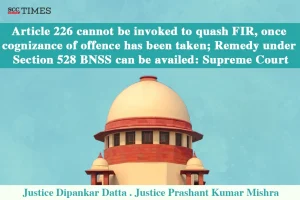Supreme Court: In the present case, the petitioner filed the special leave to appeal, challenging the order dated 1-7-2025, passed by the Bombay High Court (‘the High Court’), whereby the petition to quash the FIR was disposed of on the ground that after the charge sheet was filed, the petition had become infructuous. The Division Bench of Dipankar Datta and Prashant Kumar Mishra, JJ., stated that so long the cognizance of the offence was not taken, a writ or order to quash the FIR/charge-sheet could be issued under Article 226 of Constitution. However, once cognizance is taken, power under Section 528 of the BNSS was available to quash the FIR/charge-sheet and the order taking cognizance, provided the same was placed on record along with the requisite pleadings.
The Court stated that in the present case, the Division Bench of the High Court did have the jurisdiction to pass such an order, since its jurisdiction under Section 528 of the BNSS was also invoked and accordingly, set aside the impugned order.
Background
In the present case, a petition was filed under Article 226 of Constitution and under Section 528 of the Bharatiya Nagarik Suraksha Sanhita, 2023 (‘BNSS’) before the High Court, seeking to quash the FIR registered under Sections 420, 406 and 409 read with Section 34 of Penal Code, 1860. The Division Bench of the High Court by an order dated 1-7-2025, relied on Neeta Singh v. State of U.P., Special Leave to Appeal (Cri.) No. 13578 of 2024, dated 15-10-2024 (‘Neeta Singh case’), disposed of the petition and stated that petition had become infructuous, after filing of the charge-sheet.
Analysis, Law, and Decision
The Court observed that there was a need to clarify that, the ratio relied on by the High Court in Neeta Singh case (supra), had been correctly applied or not. There was a distinct factual dissimilarity between the petition from which the special leave petition in Neeta Singh case (supra) arose and the present writ petition.
The Court noted that in Neeta Singh case (supra), the jurisdiction under Article 227 of the Constitution or Section 482 of the Criminal Procedure Code, 1973 had not been invoked. Further, the cognizance of the offence was taken by the relevant criminal court. The Court clarified that it was in such circumstances that the writ petition under Article 226 of the Constitution was held infructuous and the impugned order was upheld.
The Court stated that in the present case, it was evident that the petition sought to invoke the twin jurisdiction under Article 226 of the Constitution and Section 528 of BNSS to quash the FIR. The police report (charge-sheet) was filed on 14-5-2025, upon completion of investigation of the FIR. However, whether the cognizance was taken by the jurisdictional magistrate, was not too clear from the impugned order. So long the cognizance of the offence was not taken, a writ or order to quash the FIR/charge-sheet could be issued under Article 226 of Constitution. However, once a judicial order of taking cognizance intervened, power under Section 528 of the BNSS was available to be exercised to quash the FIR/charge-sheet and the order taking cognizance, provided the same was placed on record along with the requisite pleadings.
The Court observed that in the present case, the Division Bench of the High Court could have examined the grievance of the petitioner, since its jurisdiction under Section 528 of the BNSS was also invoked and the relief claimed could have been suitably moulded subject to the requisite satisfaction of the court. The Court held that the Division Bench of the High Court did have the jurisdiction to pass such an order as per the “Sitting List”.
The Court opined that the Division Bench of the Bombay High Court misread ‘Neeta Singh case’ (supra), inadvertently omitted to notice the factual dissimilarity and consequently, misapplied the ratio to spurn the challenge laid by the petitioner resulting in a failure of justice. Thus, the Court set aside the impugned order and stated that the petitioner’s writ petition should stand revived for being considered afresh by the roster bench of the Bombay High Court, in accordance with law.
[Pardnya Pranjal Kulkarni v. State of Maharashtra, 2025 SCC OnLine SC 1948, decided on 3-9-2025]
Advocates who appeared in this case:
For the Petitioner: Kisalaya Shukla, AOR; Satyam Pandey, Adv.; Sandeep Kumar Dwivedi, Adv.; Krishna Kant Shukla, Adv.; Awadhesh Kumar, Adv.


